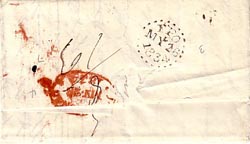Eunice and Ron Shanahan have shared with readers of the Victorian Web this material from their website, Letters from the Past. Click on thumbnails for larger images.
This letter is from H Braine living in Tours in France, to her sister Mrs Willm Otter living at Stockwell Green Kennington, then in Surrey, but part of the London Twopenny Post delivery area. The writer has written "Pour L'Angleterre" at the top of the address panel of the letter.
Postal markings on a letter sent from France to England

There are eight postal markings which makes for an interesting cover for anyone interested in the postal history. Some are on the front of the letter and some on the back, beginning with
- the circular date stamp – applied in France at the town of posting. It is a double circle with the name of the town TOURS at the top, the date in the middle 23 shows clearly, and a two figure code within brackets at the bottom (36)
- A black, framed P. F. signifying paid to the frontier. Willcocks &
Jay London postal history has this information about it.
Although they are not mentioned in the Anglo-French Conventions of 1836 and 1839, handstamps were used before 1840 to show how far the letter was prepaid between the two countries. The Convention of 1843 (later than this letter!) stated that all paid letters must be marked in the country of origin with ‘PD’ if paid to destination. ‘P’ if paid to the frontier of the originating country, and ‘PF’ if paid to the frontier of egress from the receiving country.”

Then on reaching London it has
- FPO date stamp MY 26 1834 in a dotted circle in use from 1816 to 1836
- London transfer stamp in red oval NOON MY 26 1834 Two penny post office Chief Office, as it has the month before the day.
- G:P (General Post in red) This stamp was applied to a letter transferred from the General Post for delivery in the Twopenny Post, and on which no Penny or Twopenny Post charge was due.
- However, this has been struck through, by pen, to show that the Twopenny Post charge should also be applied.
- Charge marks 5 + 8 = 13 (possibly centimes or sous?) paid in France hence the P. F. postmark, and finally
- 1/2 — the amount of money to be paid by the addressee on receipt of the letter. This was made up of 12 pence or 1/- Tours to London, then the twopenny post on transfer from the London GPO to the addressee in Kennington, in the Twopenny Post delivery area, making a total of 14pence or 1shilling and 2d shown as 1/2.
The Letter

So that is the postal history , now to the letter itself, which is a family letter giving an intriguing picture of a family divided. There are many abbreviations ‘yr’ for ‘your’ etc.
May 22nd Tours
My Dearest Nancy,
If you would consider the anxiety & uneasiness I must necessarily be feeling respecting the proceedings of William you would I am certain give me what information you could on the subject. You know as heretofore how many reasons we have had for doubting his want of strength in adhering to any resolution with regard to his wife and it would be a consolation to me to learn he is at this time keeping firm against any attempts she may be making to reunite herself and that his heart is steeled against her. Also with regard to the poor children tell me what is being done?
We have heard nothing since the 8th April, excepting a few lines from Maria Barclay the 6th of this month in which she says she is told Willm has not sold his reversionary property — Can this be true? I fear there is no such good news for us or we should have heard from Kindersly, or yr husband — Maria also mentioned that Mr Otter had got Willm's boys at that time — Has any place been yet decided on for them?”
Note: Reversionary property this is the right to possess or succeed to property on the death of the present possessor or at the end of a lease.
“We are talking of moving to Brussels the end of July which (were yr brother willing) is an obstacle against placing the children here. When settled there I do hope yr Brother might be prevailed on to have them over. Your father is well. We shall have difficulty in moving him hence.
Accept best love & with kind regards to Mr Otter, & all the girls,
Believe me, Dear Nancy
Ever your truly affect. Sister
H. Braine
We have heard from Graham, his wife was expecting to be confined, they are both well, but Graham had not as yet met with any better appointment & complains that with the utmost economy he cannot save a penny, consequently the prospect of his return must be very far distant.”
A letter like this raises a lot of questions – for instance, what were two Britons plus a father doing in Tours in 1834 — and why would they then be moving on to Brussels? I am always intrigued by a letter to a sister being signed with just an initial, I wonder why she did not just sign her name?
Last modified 26 May 2010